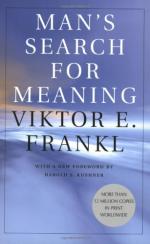
|
| Name: _________________________ | Period: ___________________ |
This test consists of 15 multiple choice questions and 5 short answer questions.
Multiple Choice Questions
1. How does the author describe the Capos?
(a) "The Capos lived in fear, knowing that they could be stripped of their privileges at any moment."
(b) "The Capos were miserable, knowing that they had betrayed their people."
(c) "The Capos enjoyed life in the prisons, and took pleasure in the humiliation of others."
(d) "Many Capos fared better in camp than they had in their entire lives."
2. Who greets the prisoners upon their arrival at the concentration camp?
(a) Cruel SS guards with dogs.
(b) The director of the camp.
(c) Cheerful prisoners speaking different languages.
(d) An unidentified man who directs the prisoners to form two separate lines.
3. How does Frankl describe the "size" of human suffering?
(a) It is relative.
(b) It is only perceptible to the individual.
(c) It is impossible to gauge.
(d) It can never be as great as it was for prisoners in Auschwitz.
4. How many mental phases does the author claim that concentration camp prisoners go through?
(a) Four phases.
(b) Two separate phases.
(c) Ten distinct phases.
(d) Three distinct phases.
5. Who does the author describe smoking in the concentration camps?
(a) Railway workers.
(b) The prisoners who worked in the kitchen.
(c) Prison doctors.
(d) The Capo and the suicidal.
6. When was there a free fight among the prisoners?
(a) Before there was a shipment of the feeble and inable to work, when prisoners struggled not to be transported to another site.
(b) Before meal time, when prisoners competed for one of the limited number of two-course meals.
(c) Before work began daily, when prisoners competed to be assigned the first jobs, as these were the least physically demanding.
(d) Before bed, when men and women competed for a place on a soft bed.
7. When Frankl was scheduled to be transported to another camp, what did the chief doctor do?
(a) Created a new position for Frankl in the next camp.
(b) Fired Frankl from his job.
(c) Forged a letter of introduction.
(d) Arranged for Frankl to stay.
8. Where does the author of the book travel in a "prison car" with small peepholes?
(a) To Switzerland.
(b) To Auschwitz.
(c) Past his hometown.
(d) Through Germany.
9. What was the main characteristic of the second phase of the prisoner's mental life?
(a) Apathy.
(b) Violence.
(c) Love.
(d) Anger.
10. What kind of event does the author attend with the camp's chief officer?
(a) A meeting where SS officials discuss punishment.
(b) A medical presentation on Measles.
(c) A private meal.
(d) A seance.
11. What kind of complex does the author write prisoners suffered from?
(a) An Inferiority complex.
(b) A Napoleon complex.
(c) A Persecution complex.
(d) A Marytyr complex.
12. What did Frankl think when he saw a group of convicts pass by?
(a) That they deserved worse punishment.
(b) That they had earned their misery while the prisoners had not.
(c) That life was unfair because he was in a position below them.
(d) That they enjoyed more well-regulated, happy, secure lives than the prisoners.
13. What job do those who greet the prisoners as they arrive to the concentration camp do?
(a) They find prisoners who are willing to lie about their identities.
(b) They separate the sick from the fit.
(c) They take charge of the belongings of the new arrivals.
(d) They decide which women are not strong enough to work.
14. What does the author claim helped to detach prisoner's minds from their surroundings?
(a) A cold curiosity about what conditions they could survive.
(b) A card game that they invented in their quarters that they looked forward to during the day.
(c) Intimate relationships with fellow prisoners.
(d) An intense fantasy life.
15. What does Frankl argue happened in camp to "sensitive people used to a rich intellectual life"?
(a) They had difficulty adapting to not being heard.
(b) They fell ill more frequently.
(c) They were beaten more harshly.
(d) The damage to their inner life was less.
Short Answer Questions
1. Why did the Capo in the author's working party do him favors?
2. Why does the author decide not to try to escape the concentration camp?
3. What did Frankl visit with the camp's chief doctor?
4. As Frankl and his fellow prisoners watched fellow prisoners, what could they calculate?
5. What position does the author volunteer for?
|
This section contains 853 words (approx. 3 pages at 300 words per page) |

|




